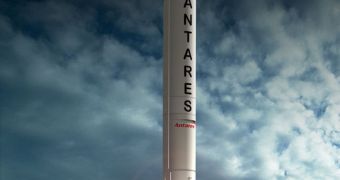Officials at the Virginia-based aerospace company Orbital Sciences Corporation (OSC) say that the maiden flight of their new rocket, the Antares, will be delayed by six to seven weeks, on account of development issues.
They went on to say that the launch will most likely take place at the end of September, or in early October. The second flight, which was supposed to see Antares launch the unmanned OSC Cygnus space capsule in orbit for the first time, is now scheduled for mid-December.
OSC is developing both Cygnus and Antares under two contracts it agreed upon with NASA, under the provisions of the Commercial Orbital Transportation Services (COTS) and Commercial Resupply Services (CRS) programs.
According to a statement by OSC CEO, David W. Thompson, it would appear that the blame for the newly announced delay is the Virginia Commercial Space Flight Authority (VCSFA), the organization in charge of constructing the launch pad for the Antares.
The rocket will carry out its maiden flight from the NASA Goddard Space Flight Center's (GSFC) Wallops Flight Facility, on Wallops Island. Thompson said the VCSFA encountered “a few unexpected obstacles in recent weeks,” which forced the company to move the original date further down the line.
The company official said that the Antares launch pad is currently scheduled for completion by August 1. By the same date, OSC should also receive its certificate of operations at the new installation.
Just a few weeks later, by the end of August or early September, the first stage of the rocket will carry out a hot fire test from the installation. Just one month later, the entire rocket – minus the Cygnus capsule – will blast off on its maiden flight, Space reports.
OSC plans to use this combo to reach the International Space Station, and deliver supplies to the permanent crew stationed there. The terms of the $1.9 billion CRS agreement call on the company to complete 8 resupply flights to the station over the next few years.
Hawthorne, California-based Space Exploration Technologies Corporation (SpaceX) is thus far the undisputed leader of the race to meet NASA's stringent terms. It launched its Falcon 9 rocket three times, and all flights were of success.
The second flight was the first live mission for the unmanned Dragon capsule, while the third saw the robotic spacecraft successfully dock to the ISS.

 14 DAY TRIAL //
14 DAY TRIAL //